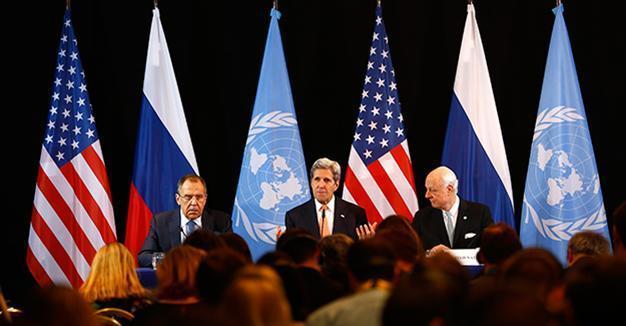All eyes on Syria as ceasefire deadline looms
BEIRUT – Agence France-Presse

AP Photo
U.S. President Barack Obama has warned Moscow and Damascus the “world will be watching” their commitment to a looming ceasefire, as the 17-nation group backing the Syria peace process prepared to fine-tune the deal.
Obama said the next few days would be critical for the partial truce brokered by Moscow and Washington - due to begin at midnight Feb. 26 - which has been agreed by both Syrian President Bashar al-Assad’s regime and Syria’s top opposition grouping.
The deal - which excludes the Islamic State of Iraq and the Levant (ISIL) and the Nusra Front - marks the biggest diplomatic push yet to help end Syria’s violence, but has been plagued by doubts after the failure of previous peace efforts.
Members of the 17-nation International Syria Support Group (ISSG) backing the process are to meet in Geneva on Feb. 26 to work out further details of the agreement, which is expected to be endorsed by the U.N. Security Council on the same day, diplomats said.
UN draft resolution to be voted on Feb 26, diplomats say
The joint draft resolution, which Russia and the United States circulated to the U.N. Security Council on Feb. 25 and diplomats say the 15-nation council plans to put to a vote on the afternoon of Feb. 26, would endorse the halt in fighting and demand that it begin as planned at midnight local time on Feb. 26.
It also “demands that all parties to whom the cessation of hostilities applies ... fulfill their commitments,” according to Reuters, which says it saw the draft resolution.
The draft further “urges all Member States, especially ISSG members, to use their influence with the parties to the cessation of hostilities to ensure fulfillment of those commitments and to support efforts to create conditions for a durable and lasting ceasefire.”
There are hopes a successful “cessation of hostilities” will lead to the resumption of peace talks that collapsed in Geneva earlier this month.
“Tomorrow is going to be a very important, I will say a crucial day,” the U.N.’s Syria envoy Staffan de Mistura told reporters at the U.N.’s European headquarters in Geneva Feb. 25.
The agreement allows military action to continue against ISIL, which seized control of large parts of Syria and Iraq in 2014, as well as against the Al-Qaeda affiliated Al-Nusra Front and other jihadist groups.
No ‘illusions’ for implementation of Syrian truce
Obama said he was certain those groups would continue to fight, but stressed the U.S.-led coalition was winning the war against ISIL, citing territorial gains.
He also said he was not “under any illusions” about possible pitfalls, but that the ceasefire could help bring about an end to the war.
“A lot of that is going to depend on whether the Syrian regime, Russia, and their allies live up to their commitments,” Obama said.
“The coming days will be critical, and the world will be watching.”
Russian President Vladimir Putin has promised to do “whatever is necessary” to ensure the ceasefire is implemented.
Russian Foreign Minister Sergei Lavrov said Feb. 25 he hoped Washington will keep its obligations under the Syria truce deal, the Associated Press reported.
Russia and the United States are on opposing sides of the conflict, with Moscow backing Assad and Washington supporting the opposition, but the two powers have been making a concerted push for the ceasefire to be respected.
Iran is also a supporter of Damascus, and U.S. Secretary of State John Kerry said Feb. 25 that Tehran had withdrawn a “significant number” of its elite Revolutionary Guards troops from Syria.
The United Nations has managed to boost aid ahead of the ceasefire deadline and expressed optimism on Feb. 25 of more deliveries.
Jan Egeland, a special advisor to De Mistura, said that more than 180 trucks filled with aid had reached six areas under siege from different sides in the past two weeks.
They have brought assistance to just under a quarter of the 480,000 people estimated to be living in 17 besieged places across Syria.
Egeland said permission had been requested to bring aid to besieged parts of Aleppo, Homs and Eastern Ghouta, all hotspots in the country’s conflict.
“We have high hopes that we will be able to get through to these places,” he said.
Observatory says Russia conducts airstrikes on rebels, Russia denies
The Syrian Observatory for Human Rights monitor said Feb 26, that Russian warplanes had carried out intense air strikes on rebel strongholds around in Syria’s Damascus, Homs and Aleppo on the same day.
“From last night [Feb. 25] to this morning [Feb. 26] there have been Russian air strikes that are more intense than usual on rebel bastions including on Eastern Ghouta east of Damascus, in the north of Homs province and in the west of Aleppo province,” Observatory head Rami Abdel Rahman said.
The Kremlin, on the other hand, said on Feb. 26 that Russian warplanes were bombing “terrorist organizations” in Syria ahead of the ceasefire, but dismissed reports that Moscow’s air force had conducted intense strikes on rebel strongholds.
“The Russian air force is certainly continuing its operation in Syria” against “terrorist organizations,” Kremlin spokesman Dmitry Peskov said.
